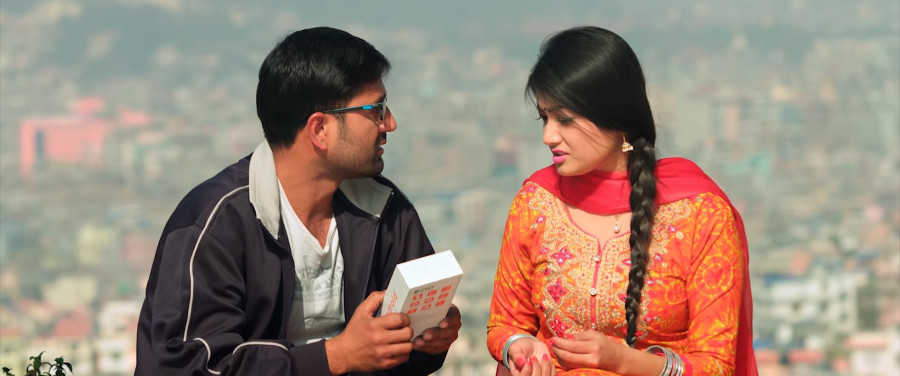Miscellaneous
Film Review: Garud Puran is carelessly-written, badly-acted, and casually misogynistic
For every film review, my work begins with scribbling notes in dark cinema halls. I sit through the films as alert as I can be, ignoring my fellow filmgoers, their giggles, phone calls and popcorn crunches. But when I’m walking out of the theatre, I’m nervous about having to comment on the same issues, over and over again for every review!
Abhimanyu Dixit
For every film review, my work begins with scribbling notes in dark cinema halls. I sit through the films as alert as I can be, ignoring my fellow filmgoers, their giggles, phone calls and popcorn crunches. But when I’m walking out of the theatre, I’m nervous about having to comment on the same issues, over and over again for every review!
Last week, I watched Garud Puran and this film is another in the long list of carelessly-written, badly-acted, casually misogynistic films I’ve reviewed.
My notes for the film read: “similarity in plot design—the redundant ‘briefcase full of money’ trope; useless overloading of characters—many of them unnecessary; horrible treatment of female characters—borderline misogyny; zero entertainment value; loud acting; cinematography more suited to YouTube; bad rip-off; and monkey with machine guns—irresponsible work from the director”. From Changa Chet to Jai Shree Daam to Garud Puran, it almost feels like we are being served the same film, over and over again.

Kasam Nepal has penned the story while the screenplay is written by Akash Baral, Binod Khatiwada and Subash Koirala, who is also the director. Now, all the aforementioned are young men in their late twenties and early thirties. They have access to world cinema and a quick scan through their social media feeds reveals that they are well versed in the nuances of filmmaking. However, when it comes to applying that knowledge to their own work, the filmmakers look like amateurs with no idea of the power of the medium they are serving.
The plot of the film is quite convoluted. The film begins with a wedding band celebrating Hastey’s (Najir Husen) third failed attempt to leave the country. This band is Hastey’s family’s, who are in debt because of him. Of course, the wedding band is irrelevant to the film. The trumpets are later used as props for a fight scene and a few of the dialogue scenes are set at a wedding reception, but that’s about it. The band has no bearing on the outcome of events in the film.
That reminds me, the film’s title, Garud Puran, is also irrelevant to the film’s plot.
Rambo (Karma) is Hastey’s friend and one of the most problematic characters in the film. He is introduced as a man with a small penis and mostly talks in double entendres. The worst part is that he doesn’t seem to understand the idea of consent. He’s got his lecherous eyes on Jyoti (Priyanka Singh Thakuri), who rejects his advances multiple times and yet, he keeps harassing her. At one point, she pours a bucket of water over his head but the woman’s opinion be damned, this moment is shot in slow motion. Had this been real life, Rambo’s actions would’ve been deemed criminal. However, for the film’s writers and director, this criminal behaviour is their idea of romance.
The primary problem with the writing is the casual misogyny used to hide the terrible plot. To the male writers, their female characters are either plain dumb or nonsensical loudmouths who should be hated. First, there’s Jyoti, whose only motivation in life is to own an expensive mobile phone—and a man who can get it for her. Her beau, Kishor (Praveen Khatiwada), constantly tries to win her affection by buying her gifts. She spends time with the sex-crazed Rambo or anyone else who dangles money in front of her.
Another female character, played by Janvi Bohra, doesn’t even get a name. She has nothing to do in the film, apart from appearing a few times. A more prominent woman is Mann Kumari (Loonibha Tuladhar). She is penned as a monster of a woman, who is fat shamed by the men on multiple occasions. She is all talk and so dumb that she manages to get swindled by the same men she owes money to.
Herein lays my biggest gripe with films being made in Nepal today. Women are either portrayed as sex objects or they don’t matter to the story at all. When mass media starts treating women inconsequently, over and over again, this behaviour is bound to reflect in society. This is where being morally responsible comes in. The situation is sadder for Garud Puran. As even with four learned, social media savvy writers at the helm, the film couldn’t have an inkling of respect for women.
In comparison to the female characters, the male characters have of course been more thoughtfully designed. Don Kumar (Kameshwor Chaurasiya) is a rowdy man looking for respect. In the past, he is said to have had over 40 people under him, but due to his conflict with Mann Kumari, he only has a few men left. Don Kumar’s minions—Khukuri Don (Kamal Devkota), Bire (Saroj Shrestha) and Dhire (Keshav Singh Thagunna)—are the only ones who manage a few laughs out of the film’s running joke of eating chicken.

The comic Dons aside, none of the actors should be proud of their performances. Najir Husen conveys boyish charm but he is annoyingly loud, almost screaming out his dialogues. A lot of long, steady takes makes it obvious that the actors were allowed to improvise. One scene has Karma pick up a fallen piece of meat, put it back on his plate, and continue with the scene. Things like these are a sign of the confidence you gain as a veteran actor who has been in the industry for almost a decade. Karma can perform and we have witnessed that, but his choice of roles in recent years—and specifically this film with its tacky dialogue—will leave you upset.
The biggest disappointment, however, is the team of Subash Koirala and Sushan Prajapati. In 2012, the duo gave us a small but beautifully relevant film, Apawad. The film was genre bending and it was panned as a rip-off of a Korean film. But it had soul. It’s still one of the best performances by Raj Ballav Koirala and Prajapati’s experiment with DSLR cameras proved that an honestly-made film can never go wrong, no matter your limitations. Fast-forward seven years and Koirala-Prajapati don’t seem to care for story, soul or cinematography. Lacking any wide shots, Garud Puran almost feels as though it’s designed for smartphones rather than the big screen.
Greed is not always a bad thing and it’s completely okay to make a commercial film. But you still need to entertain the audience. Director Koirala, in an interview about this film, said that his only intention was to show people a good time. But with recycled plots, loud vapid performances and misogyny, he is not going far.
It’s no secret that Nepali films have a relatively smaller audience compared to Hindi or Hollywood films, and if we don’t come up with at least a few films that are driven by something other than the current clichés, we are in deep trouble. Maybe it’s time for the Nepali film industry to introspect a little. The audience will not continue to watch Nepali films just because they’re Nepali films.
Director: Subash Koirala
DOP: Sushan Prajapati
Writer: Kasam Nepal
Screenplay: Akash Baral, Binod Khatiwada, Subash Koirala
Actors: Najir Husen, Karma, Praveen Khatiwada, Kameshwor Chaurasiya
Genre: Comedy
Stars: 2 out of 5




 9.89°C Kathmandu
9.89°C Kathmandu










